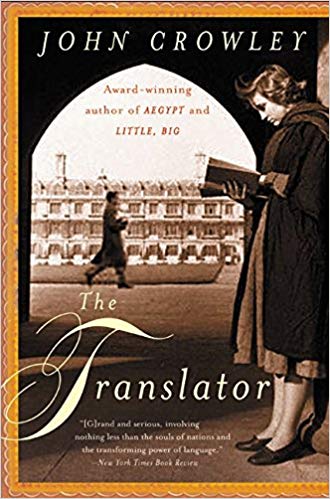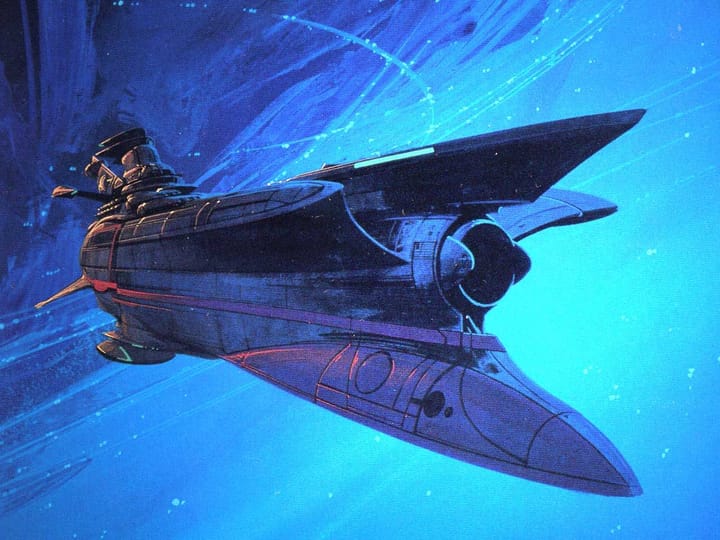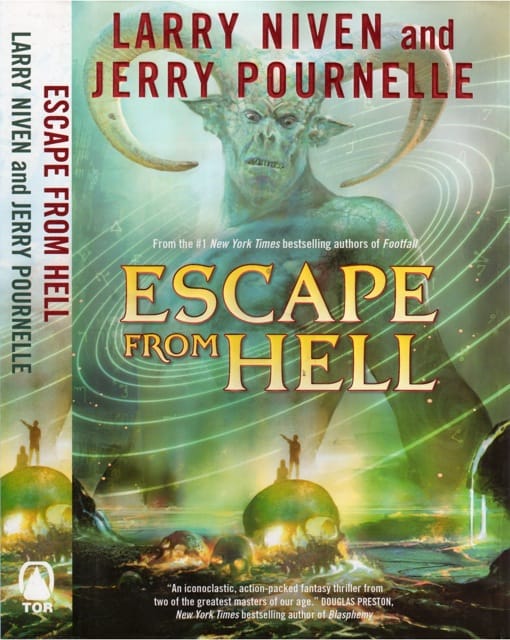The Long View: The Translator

John J. Reilly’s book review of John Crowley’s The Translator comes up at an apropos time: I am digesting a history of science fiction in the twentieth century, and The Translator seems to be a good example of science fiction as a kind of secular scripture.
There is one definition I want to post from 1973, because it is very revealing as to the type of people who made this separation such an obsessive goal to begin with. This is by Bulgarian writer Elka Konstantiova:
"Even though the origins of science fiction go back to the mid-19th century, nonetheless as a new literary genre, charged with special social functions, science fiction is the undoubted product of the nuclear age. The more meaningful the scientific and technological breakthroughs and their impact on modern life, the greater the role of science fiction, stimulating our vision for things to come, especially in the aspect of the changes wrought in man's mentality by the scientific and technological revolution. Science fiction brings home the awareness that the future will continue to bring radical changes in all areas of man's life; science fiction is there to prepare him for this eventuality."
In other words, it's secular scripture. Science fiction is a way to guide the populace by informing them on what path they should take to build a better tomorrow. Which better tomorrow, you might ask? Well, the one that will advance humanity as a whole.
This novel is a metaphorical [or metahistorical] interpretation of the Cuban Missile Crisis, and thus very much fits the mold described above.
The Translator
By John Crowley
HarperCollins, 2002
295 Pages, US$24.95
ISBN 0-380-97862-8
Remember the Great Atomic War of 1963? It's odd that you shouldn't, or so it seemed in later years to Christa Malone, the protagonist in this metahistorical interpretation of the Cuban Missile Crisis:
"The final logic of this [20th] century, this century that believed in logic and history and necessity, the final spasm so long and well prepared: it didn't happen, and now seemed likely never to happen."
The Translator explains why the inevitable did not happen, as well as something of the conflict in a higher world that the historical incidents of those days darkly reflected. This novel is not the long-awaited fourth volume of John Crowley's great work, the Aegypt series, but it does treat of many of the same themes: the end of the world, the hermetic subtext of everyday life, and the multiplicity of histories. The book is not precisely fantasy or science fiction, though readers may be reminded of Ursula LeGuin's The Lathe of Heaven. Rather, the author tries to use just the suggestion of magic in order to rise above history and show that it is not what it seems. As a technique, that works well enough. However, the exercise also presents an example of the fallacy of "beyondism." Though affecting to view a historical conflict from the point of view of eternity, the author is really picking a side, and the stupid side at that.
A love story holds the novel together. Christa "Kit" Malone, a Catholic girl with a recently acquired dark past, comes to a Midwestern university in 1962. She makes many discoveries, some of them specific to her era. She is, for instance, slightly surprised to find that there really are Communists in America; she had begun to suspect that the nuns at school had make them up as minatory figures. Her chief discovery, though, is a Russian poet-in-exile, the mysterious Innokenti Isayevich Falin.
Falin is an uncanny fellow. He is one of those people, for instance, who seem able to appear and disappear without being seen to come and go. More concretely, there is the persistent question of why the Soviet government chose to exile him, when they did not exile, say, Pasternak. He also tells of a kind of life in the Soviet Union that has nothing to do with either the official world of the "gray gods," to use his phrase, or with the anticommunist polemics Kit heard from her nuns. Falin spent part of his childhood as a homeless vagabond in a Dickensian world of youth gangs and train stations, but "with no Dickens to make things right." Even in later life, Russia for him was a place where people just got lost, or were arrested for no reason even the jailors could name.
Kit becomes Falin's student, and later his translator. A fair amount of this book is about the difficulties of translation from one language to another, about whether a poem in translation is really the same poem. This being a John Crowley novel, however, we soon learn that translation is only a metaphor for the interface of worlds:
"Events in the world can perhaps be like rhyming words in poems: they can only, what would you say, pay off in one world, one translation, not in others. In one world people are cheering and weeping with joy, for best conclusion has been reached, heroes have come home safe. In another world, say this world, same events are events of no significance."
Falin's presence turns out to be of great significance in all worlds, however, because he is the way through which the apocalyptic logic of the 20th century can be confounded. Explaining it to her father long afterwards, Kit puts the reality of the Cold War this way:
"I think that back then, when he came to this country, there was a struggle going on between the angels of the nations, his and ours; and that in their anger and their fear, those angels came to destroy the world..."
Crowley's angels generally have more to do with the angels of the schoolmen than with those of popular comfort. Often they are like mathematical objects, insectile intelligences, both omniscient and stupid. There is more to be said about them, however. The great angels of the nations are attended by lesser angels, almost shadows, which complement their greater brethren's strengths and weaknesses. Falin describes the relationship in a poem written just before his disappearance, on the very night the danger of nuclear war crests and recedes. (There is a fair amount of original poetry in The Translator, and it's pretty good.):
"If a nation's angel is proud, then the other is shy
Brilliant if the nation's angel is dull
Full of pity if the angel shows none
Laughing if it always weeps, weeping if it cannot weep."
In a mysterious way, Falin embodies the lesser angel of Russia. In a wrap-around story set in a conference at St. Petersburg after the end of the Cold War, really a sort of Judgment Day in an afterlife, one of Falin's old friends expresses the real significance of Falin's exile:
"[The] worst thing such a corrupted great angel could do would be to send away into exile the lesser angel who is paired with him."
In some way that is not clearly explained, Falin intrudes himself into the attention of the idiot angels at just the right time to distract them from their work of mutual destruction. He dies, or returns to Russia, or otherwise vanishes, with only a car sunk ambiguously in a river to hint at his fate. The balance of the world begins to right itself, and we are given to understand that John Kennedy's assassination a year later was a compensating sacrifice.
The Translator reworks a notion that Crowley has been using for years. It is clearly set out in his famous story, The Great Work of Time, in which a disconcerted time traveler has this to say about an early 21st century world whose past has been unduly tinkered with:
"It was not simply a world inhabited by intelligent races of different kinds: it was a harder thing to grasp than that. The lives of the races constituted different universes of meaning, different constructions of reality; it was as though four or five different novels, novels of different kinds by different and differently limited writers, were to become interpenetrated and conflated: inside a gigantic Russian thing a stark and violent policier, inside that something Dickensian, full of plots, humor, and eccentricity. Such an interlacing of mutually exclusive universes might be comical, like a sketch in Punch; it might be tragic, too. And it might be neither: it might simply be what is the given against which all airy imaginings might finally be measured: reality."
This is not a bad way to put a story together, though we usually find it only in very long novels. The conceit of alternative realities lets us see the box-in-a-box structure. However, The Translator shows that this kind of structure is not necessarily a good way to think about history, or at any rate to write about it. If we can see the alternative worlds, we are outside them and can judge between them. The problem is that, in Crowley's telling, the view from eternity is awfully parochial. We get the first hint of this when Falin the Lesser Angel expresses reservations about a commencement speech that called on the graduates to simply "stick to your dream":
"Some dreams we do not wish that people stick to: we hope that they are weak, and do not cling to these dreams, that they fail to hold on. A dream that one day this world will be free of Jews. That Soviet Union will be destroyed. That all enemies of the state will be crushed. That only one God prevail everywhere."
One might plausibly object that these four aspirations do not belong on the same list. Indeed, it could be that anyone who thinks them morally equivalent is not unusually broadminded, but suffers from blinkered vision. In fact, as the story moves through the climax of the Cuban Missile Crisis, we see that the view from eternity is essentially that of the early New Left. Kit learns that the sepia undergraduate world of the Kennedy years is a front for cruel and secret powers, as if the Land of Oz were really ruled by the East German Stasi. She even meets America's own lesser angel, in the person of an "intelligence agent" who could have walked out of an episode of Rod Serling's Twilight Zone. (He could not have come from The X-Files: Crowley does get the period right.) This discovery changes her life, even causing her to leave the country for a while. Eventually, though, she comes to grips with the powers that be:
"It was only when others who were braver than she was stood up to it - to them, to the secret power - gave a name to it, spoke truth to it; only when they came out in thousands and then tens of thousands singing Dona nobis pacem, that she found she could too."
It is perhaps some evidence that people really do live in different realities that I found this transformation so shocking. Could it really be the case that, even today, there are people who think that conversion to the New Left was a kind of enlightenment? Evidently, there is a world in which the victory of the West in the Cold War was an event without a rhyme.
Even so, it would be a mistake to miss this book because you might not find the political subtext congenial. The Translator succeeds in portraying the days of "The New Frontier" as the haunted time it actually was, as full of premonition in its way as the years before 1914. One need not be metaphysically inclined to accept that there may be more to history than meets the eye. For those who are so inclined, this book has good and bad angels for all.
Copyright © 2002 by John J. Reilly
Support the Long View re-posting project by downloading Brave browser. With Both Hands is a verified Brave publisher, you can leave me a tip too!



Comments ()